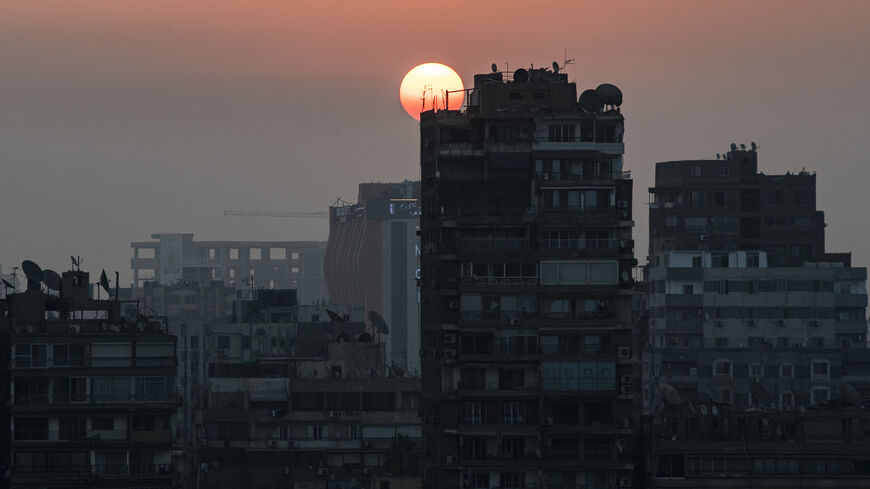CAIRO, Egypt — Egypt’s non-oil private sector took a severe hit in November due to high inflationary pressures compounded by a recent depreciation of the currency, suffering its sharpest contraction in two and a half years, according to the latest Purchasing Managers Index (PMI).
The survey, compiled by S&P Global, is designed to give a snapshot of operating conditions in the non-oil private sector economy. With the contraction recorded in November, Egypt’s non-oil private sector has now been in the red for two consecutive years. It crossed the line with the worst reading since June 2020 and the quickest fall in activity documented since the beginning of 2017 if the initial phase of the COVID-19 pandemic, marked by the lockdown, is set aside.
The contraction captured by the PMI comes in spite of Egypt’s Ministry of Planning and Economic Development’s Nov. 28 announcement of a 4.4% economic growth in the first quarter of the current fiscal year, which began in July. And despite the private sector stalling in the contractionary territory since Nov. 2020, the government still sticks to a 5% growth projection for this fiscal course, revealing a broad discrepancy.
“All economies go through stages, and in the case of Egypt it has gone through the most significant changes and stresses for over a decade." Angus Blair, CEO of the Signet Institute, told Al-Monitor.
"When you consider that this was very much an economy controlled by the state," he argued, evolving into the semi-private sector has involved "very significant stresses, economically, that haven’t really been handled well.”
The latest PMI for the country’s non-oil private sector recorded a drop from 47.7 points in October to 45.4 in November, well below the 50-point line that separates expansion from contraction. One of the main reasons for this dip was a rapid decrease in business activity, which the panelists surveyed by S&P Global attributed mainly to the output cuts they were forced to make in the wake of accelerated cost hikes and a fall in new orders.
According to the report, 42% of the around 400 surveyed businesses saw their overall costs increase since October, a much higher proportion than the 14% that saw a concurrent rise in selling prices. In parallel, the decline in new orders is seen as a result of customer spending cuts mainly caused by rapid inflation and high interest rates.
The study also identifies the sharp depreciation of the Egyptian pound against the dollar at the end of October, which pushed purchase-price inflation to a 52-month high, as one of the key factors behind the hit recorded in November.
“The pound’s depreciation against the US dollar led to a marked increase in prices paid for raw materials, which have already been exacerbated by import restrictions since early 2022,” David Owen, an economist at S&P Global Market Intelligence, was quoted as saying.
On the purchasing side, the survey states that rising import costs and falling new orders prompted businesses to rapidly cut input buying levels in November, with some companies turning to old stocks to meet demand. Supplies were also said to have been hampered by a renewed lengthening of delivery times.
On a more positive note, the companies surveyed reported expanding their workforces in November for the fourth time in five months and also recorded a slight increase in wages.
Business confidence recovered slightly from the low levels registered in October as well, although concerns persist about factors such as high inflation, interest rates, currency volatility and the global economic slowdown.
“While the latest foreign exchange move signals a further rise in inflation in November, it is hoped that slowing demand and falling commodity prices will start to alleviate price pressures in the medium to long term,” Owen wrote.
Although the scope of the PMI is somewhat limited, the index is seen by many experts and observers as revealing of the state of Egypt’s private sector.
“The PMI is a survey of senior executives at selected private sector companies in the non-oil sector. Given that the private sector still accounts for a small portion of the overall economy, the survey results might not capture growth stemming from the public sector,” Callee Davis, an economist at Oxford Economics Africa, told Al-Monitor.
“This means the PMI results might not always be extendible to the entire economy. But they still provide useful insights into the current business operating conditions,” she said.
Charles Robertson, global chief economist at the frontier investment bank Renaissance Capital, believes that one of the main underlying factors that explain why Egypt’s non-oil private sector has been in contraction territory for two years in a row is related to the nature of the country’s economic growth.
“Much of Egypt’s growth has come via investments in the energy sector or government’s investments in infrastructure. If you take a sample of like 100 companies in a PMI survey, relatively few are likely to be benefiting directly from growth in these two sectors. They will instead be more focused on the unhelpful impact of interest rates, the limited bank lending and wages growth — which together would explain a negative PMI,” he said.
“In brief, many Egyptian companies will not be getting a benefit from growth led by the energy sector and government spending on infrastructure,” Robertson concluded.







